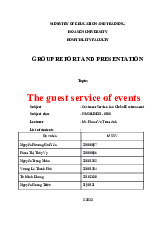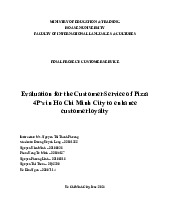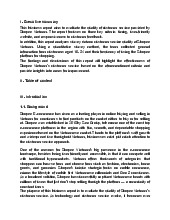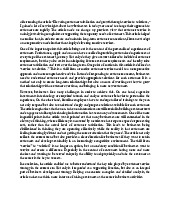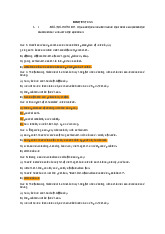





Preview text:
FINAL EXAMINATION
TERM 14.1A - YEAR 2014-2015 Code: (A)
COURSE NAME: CONSUMER BEHAVIOR
Course Abbreviation and Number: MK202DE01
Duration of Exam: 120 mins
☑ Closed book/ Đề thi đóng
☑ Hand in examination paper/Thu lại đề thi
☑ No additional materials are allowed/ Không được sử dụng tài liệu
☑ Printed dictionary is allowed/ Được phép sử dụng từ điển in STUDENT NAME: STUDENT ID: STUDENT SIGNATURE:
INSTRUCTIONS TO CANDIDATES/ HƯỚNG DẪN CHO THÍ SINH 1.
Enter your name and student id and sign in the space provided at the above table.
2. This is a closed book examination; therefore no written materials, reference books or notes will be
permitted into the examination room. 3.
Write your answers in the answer sheet provided. Number of each question clearly. 4.
This examination is divided into : two parts
Part A: Twenty multiple - choice questions – answer all questions (4 marks)
Part B: Essay – answer all questions (6 marks) 5.
At the end of the examination, hand in both the question paper and the answer sheet
This examination is worth 50% of the final assessment.
____________________________________________________________________________ PAGE/4
This question paper consists of 4 (four) pages PAGE/4
PART A – COMPULSORY MULTIPLE-CHOICE QUESTIONS (20 x 0.2 = 4 marks)
Write clearly the question number and the letter corresponding to the correct answer for each
question in the answer booklet provided.
Q1. A consumer researcher who examines
more he wishes lunchtime would hurry and
consumers' lifestyles and personalities is
arrive. He is already planning what he will eat studying ________.
and how good it will taste. Which of the A) demographics C) social class
following processes most accurately identifies B) psychographics D) roles what Jake is feeling?
Q2. Which of the following is NOT one of the A) the goal process
three stages of the process of perception? B) the directionality process A) interpretation C) attention C) the motivation process B) adaptation D) exposure D) the involvement process
Q3. A billboard is positioned beside a busy
Q7. ________ is based on the premise that
highway. However, the merchant that has
people have a need for order and consistency
purchased the billboard complains that no
in their lives and that a state of tension exists
response is being generated by his advertising
when beliefs or behaviors conflict with one
message. Upon closer inspection, the billboard another.
company determines that the typeface used is A) Expectancy theory
too small to be effectively read by a motorist
B) The theory of cognitive dissonance
going 60+ mph on the highway. Which of the C) Value theory
following sensory thresholds would be most D) Choice theory
appropriate to explain the failure of this
Q8. Popular online matchmaking services
advertisement to connect with motorists?
such as match.com and eharmony.com offer to A) the intensity threshold
create your "personality profile" and then B) the differential threshold
hook you up with other members whose C) the absolute threshold
profiles are similar. This is an example of an D) the relative threshold
approach to personality that focuses on the
Q4. Classical conditioning takes place when a
quantitative measurement of ________.
________ is continuously matched with a
A) personality traits C) Freudian theory ________. B) brand theory D) subconscious
A) conditioned stimulus; conditioned response desires
B) unconditioned response; conditioned
Q9. The ideal self is a person's conception of response how she ________.
C) conditioned stimulus; unconditioned
A) adapts to play different roles stimulus
B) imagines others to think of her
D) unconditioned stimulus; unconditioned
C) realistically thinks she is response D) would like to be
Q5. What mechanism is used when a
Q10. The theory of cognitive dissonance is
consumer learns to perform responses that based on the ________. produce positive outcomes? A) knowledge function A) extinction
B) principle of cognitive consistency B) punishment
C) principle cognitive affect conflict C) negative reinforcement
D) self-identification function D) positive reinforcement
Q11. What do the "A, B, Cs" of the ABC
Q6. Jake feels a hunger growing in his model of attitudes stand for?
stomach. The more he feels the hunger, the
A) attitudes, business, and consumption PAGE/4
B) assumptions, best practices, conditions
D) She should look for people who stand out
C) affect, behavior, and cognition in a crowd. D) approval, behavior, context
Q15. If a fireman told you to leave your
Q12. Professor Kerton found a small shop
apartment, you would comply because the
near campus that sells a wide variety of fireman has ________ power.
breads, sandwiches, and coffees. It has A) information C) expert
become almost a second office for him. He B) legitimate D) reward
has a booth in the back that is "his," and
Q16. Dr. Sam Jones has a decision to make.
students have learned where to find him. The
He must decide whether to expand his clinic
professor loves this shop because it attracts
by 50 percent or to keep it at its current size.
other people like himself who share the same
The move would cost him $500,000 and
norms and rituals. The shop has ________
potentially tie him to debt for 20 years. Dr. meaning to Professor Kerton.
Jones believes the economy is going to get A) power C)
even better in the future and that his clients compensatory
believe the same thing. He knows that they B) life-cycle D) cultural
are going to need even more health care
Q13. An American company did a large share
services as they age. Given these facts, Dr.
of its business with a firm from Japan. The
Jones is making his decision based on which
president of the company wanted to give a gift of the following variables?
to the Japanese firm as a symbol of
A) shifting social class structure
appreciation for the successful year they had B) consumer confidence
enjoyed. He wasn't sure what to give, so he
C) supply and demand based on consulting
brought in a Japanese consultant. According to reports
the discussion in the text about giving gifts in
D) statistical analysis of a market
Japan, what advice is the consultant most
Q17. Consumers who are ________ love likely to give? buying everything in sight.
A) Don't give the gift at all; it will only be A) tightwads
confusing to the company's Japanese B) price-sensitive affluents colleagues. C) spendthrifts
B) The gift should be very expensive or the D) brand aspirationals
Japanese colleagues will be insulted.
Q18. ________ occurs whenever the
C) The gift should be given casually so as to
consumer sees a significant difference not create any expectations.
between his or her current state of affairs and
D) The economic value of the gift is not as some desired or ideal state.
important as the symbolic meaning. A) Information search
Q14. A marketing manager who wants to B) Evaluation of alternatives
identify opinion leaders for her product
C) Evaluation of the evoked set
category should do which of the following? D) Problem recognition
A) She should find socially active persons
Q19. Kent is a loyal Coca-Cola drinker. As a
who are intensely interested in the product
college student, he averages about six Cokes a
category and who are similar to other
day. He even prefers Coke to water. However, customers.
today when he passes a vending machine in
B) She should find government officials who
his dorm, he buys a new flavor of soft drink use the product.
called Big Red. Which of the following most
C) She should find intellectuals who can write
accurately explains his behavior, given the
and speak well so that communication will be
facts about Kent's previous behavior? facilitated. A. Kent is variety seeking. B. Kent is brand switching. PAGE/4
C. Kent is involved in extended problem
to the store, Julie is always in a better mood. solving.
Springer's Old Country Gifts has attracted
D. Kent is influenced by peer pressure Julie with its ________.
Q20. Julie Morgan loves to go into Springer's A) store position
Old Country Gifts. It always smells like a field B) atmospherics
of spring flowers. The lighting gives all the C) subliminal cues
products a warm glow, and the mood music is D) in-store displays
just perfect for casual browsing. After her visit
PART B – CASE STUDY ANALYSIS (6 marks) Question 1 (2 marks):
Many studies have shown that our sensory detection abilities decline as we grow older. Explain how
sensory detection abilities decline, and discuss the implications of the absolute threshold for
marketers attempting to appeal to the elderly. Question 2 (2.5 marks):
List and define the five stages of the consumer decision-making process. Question 3 (1.5 marks):
What sources of information are most valuable to you when making a decision on purchasing (a) a
computer, (b) selecting a place to dine out, and (c) something online? Explain ----End of Paper ---- PAGE/4
PHẦN DÀNH RIÊNG CHO GIẢNG VIÊN RA ĐỀ VÀ CHỦ NHIỆM BỘ MÔN DUYỆT ĐỀ
(Không photo kèm theo đề thi) ĐỀ THI CUỐI KỲ
HỌC KỲ 14.1A NĂM HỌC 2014 – 2015 Mã đề: (A)
TÊN MÔN THI : CONSUMER BEHAVIOR MSMH
: MK202DE01 Có câu hỏi trắc nghiệm ⌧ Thời lượng thi
: 120 phút (không kể thời gian phát đề)
Chịu trách nhiệm đề thi
Họ và tên giảng viên
Giảng viên/các giảng viên ra đề thi TRẦN THỊ THU HIỀN
Khoa/ Bộ môn duyệt đề thi HÀ THỊ NGỌC OANH
Ký duyệt đề : ____________________Ngày duyệt: _____/____/_______
